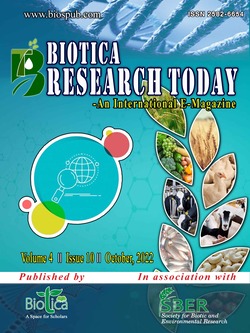
Role of Phytase in Poultry Ration
Pallab Borah
ICAR-Research Complex for NEH Region, Umiam, Meghalaya (793 103), India
J.W.B. Wankhar
ICAR-Research Complex for NEH Region, Umiam, Meghalaya (793 103), India
Sourabh Deori*
ICAR-Research Complex for NEH Region, Umiam, Meghalaya (793 103), India
DOI: NIL
Keywords: Nutrition, Phosphorus, Phytase, Poultry
Abstract
Phosphorus is available in inorganic and organic form in plants mostly in the seeds and cereals. Only 30% of it freely available and rest is present in the form of phytate-bound phosphorus known as phytic acid. Mammals have enzyme called phytase, a chemical found in their digestive system that breaks the phytic acid and releases the bound phosphorus. However, poultry lacks the enzyme. The feed needs to be supplemented with inorganic phosphorus sources, thereby making the formulated ration expensive. Therefore, the enzyme phytase could be added in the poultry ration @ 500 IU and 1000 IU ton-1 feed which may be more cost efficient and economical. Addition of phytase enzyme in poultry ration would results in better utilization of dietary phosphorus and other minerals like Ca, Zn, Cl, etc. It also improves digestibility of amino acid and ultimately results in better growth and performance of the poultry birds.
Downloads
not found
Reference
Jain, A., 2021. Effect of phytase supplementation on production performance and economics of Kadaknath chickens. Indian Journal of Animal Sciences 91, 953-956.
Panda, A.K., Sahoo, B., Kumar, A., 2020. Effect of low nutrient density diets on performance of vanaraja laying hens in intensive system of production. Indian Journal of Animal Nutrition 37, 335-339.
Peter, H.S., Velmurugu, R., 2007. Microbial phytase in poultry nutrition. Animal Feed Science and Technology 135(1-2), 1- 41.
Punna, S., Roland, D.A.S., 1999. Variation in phytate phosphorus utilization within the same broiler strain. Journal of Applied Poultry Research 8, 10-15.
Singh, P.K., 2008. Significance of phytic acid and supplemental phytase in chicken nutrition. Worlds Poultry Science Journal 64, 553-580.
